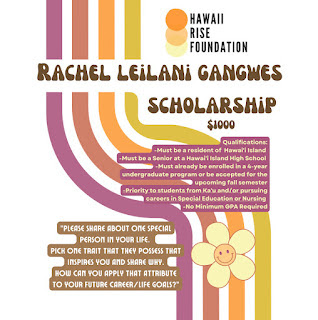 |
| View of Mauna Loa eruption before dawn Nov. 27, 2022 from Hwy 11 between Pāhala and Volcano at Mile Marker 34. Photo by Tanya Ibarra |
MAUNA LOA'S ALERT LEVEL HAS BACKED DOWN TO NORMAL, following the eruption that lit up the island last November into December. U.S. Geological Survey changed the alert level from advisory to normal on Thursday. Aviation Color Code for Mauna Loa is lowered from Yellow to Green.
According to USGS, since its 1843 eruption, Mauna Loa erupted 34 times with intervals lasting months and decades. Before last November, this largest active volcano on the planet last erupted in 1984.
USGS Hawaiian Volcano Observatory issued a statement on Thursday, saying, "Mauna Loa has been quiet for the past three months since the eruption ended on December 13, 2022. The number of earthquakes beneath Mauna Loa’s summit has returned to background levels. Inflation of Mauna Loa continues as magma replenishes the summit magma chamber."
To read comments, add your own, and like this story, see facebook.com/kaucalendar. See latest print edition at kaucalendar.com, in the mail and on stands.
 |
| James Takamine, President & CEO of CU Hawai'i Federal Credit Union |
James Takamine, CEO of CU Hawai'i, said, "It is much safer to keep your deposits in a financial institution such as CU Hawai'i than to take deposits out and hold them as cash. Any cash on hand is not insured and may be destroyed in the case of fire or other natural disaster. Also, cash may be stolen or lost. CU Hawai'i has been serving the community on Hawai'i Island since 1955 and has weathered many financial downturns in the economy. We have a long history and track record of managing risk, liquidity, and ensuring the safety of member deposits, and are well-capitalized. Please rest assured that your deposits are safe with CU Hawaii Federal Credit Union. We look forward to continuing to meet your needs and those of our community." In Ka'u, CU Hawai'i has offices in Nā`ālehu and Pāhala with an ATM in Ocean View. Its message says, "CU Hawai'i’s first priority is your financial success, and we focus on financial security." Not a bank, CU Hawai'i is a federal credit union regulated and insured by the National Credit Union Administration. Created by the U.S. Congress in 1970, the National Credit Union Administration is an independent federal agency that insures deposits at federally insured credit unions, protects the members who own credit unions, and charters and regulates federal credit unions. See MyCreditUnion.gov.
Member deposits at CU Hawai'i are insured by the NCUA, a separate fund not associated with the Federal Deposit Insurance Corporation for banks. The NCUA website says: “The National Credit Union Share Insurance Fund was created by Congress in 1970 to insure members’ deposits in federally insured credit unions. Each credit union member has at least $250,000 in total coverage. Administered by the NCUA, the Share Insurance Fund insures individual accounts up to $250,000. Additionally, a member’s interest in all joint accounts combined is insured up to $250,000. The Share Insurance Fund also separately protects members’ IRA and KEOGH retirement accounts up to $250,000 and provides additional coverage for members’ trust accounts.
"The Share Insurance Fund has the backing of the full faith and credit of the United States. Credit union members have never lost even a penny of insured savings at a federally insured credit union.”
 |
| In the mail and on stands. |
St. Jude's Hot Meals are free to those in need on Saturdays from 9 a.m. until food runs out, no later than noon. Volunteers from the community are welcome to help and can contact Karen at pooch53@gmail.com. Location is 96-8606 Paradise Circle Drive in Ocean View. Those in need can also take hot showers from 9 a.m. to noon and use the computer lab from 9:30 a.m. to 1 p.m.
Free Meals Mondays, Wednesdays, and Fridays are served from 12:30 p.m. to 3:30 p.m. at Nā'ālehu Hongwanji. Volunteers prepare the food provided by 'O Ka'ū Kākou with fresh produce from its gardens on the farm of Eva Liu, who supports the project. Other community members also make donations and approximately 150 meals are served each day.
OUTDOOR MARKETS
-1.jpg) |
| https://www.okaukakou.org/scholarships -for-local-students |
Volcano Swap Meet, fourth Saturday of the month from 8 a.m. to noon. Large variety of vendors with numerous products. Tools, clothes, books, toys, local made healing extract and creams, antiques, jewelry, gemstones, crystals, food, music, plants, fruits, and vegetables. Also offered are cakes, coffee, and shave ice. Live music. Volcano Farmers Market, Cooper Center, Volcano Village on Sundays, 6 a.m. to 10 a.m., with local produce, baked goods, food to go, island beef and Ka'ū Coffee. EBT is used for Supplemental Nutrition Assistance Program, formerly Food Stamps. Call 808-967-7800.
O Ka'ū Kākou Market, Nā'ālehu, Wednesdays, 8 a.m. to 2 p.m. Contact Nadine Ebert at 808-938-5124 or June Domondon 808-938-4875. See facebook.com/OKauKakouMarket.
Ocean View Community Market, Saturdays and Wednesdays, 6:30 a.m. to 2 p.m., corner Kona Dr. Drive and Hwy 11, near Thai Grindz. Masks mandatory. 100-person limit, social distancing required. Gate unlocked for vendors at 5:30 a.m., $15 dollars, no rez needed. Parking in the upper lot. Vendors must provide their own sanitizer. Food vendor permits required. Carpooling is encouraged.





